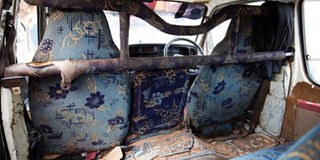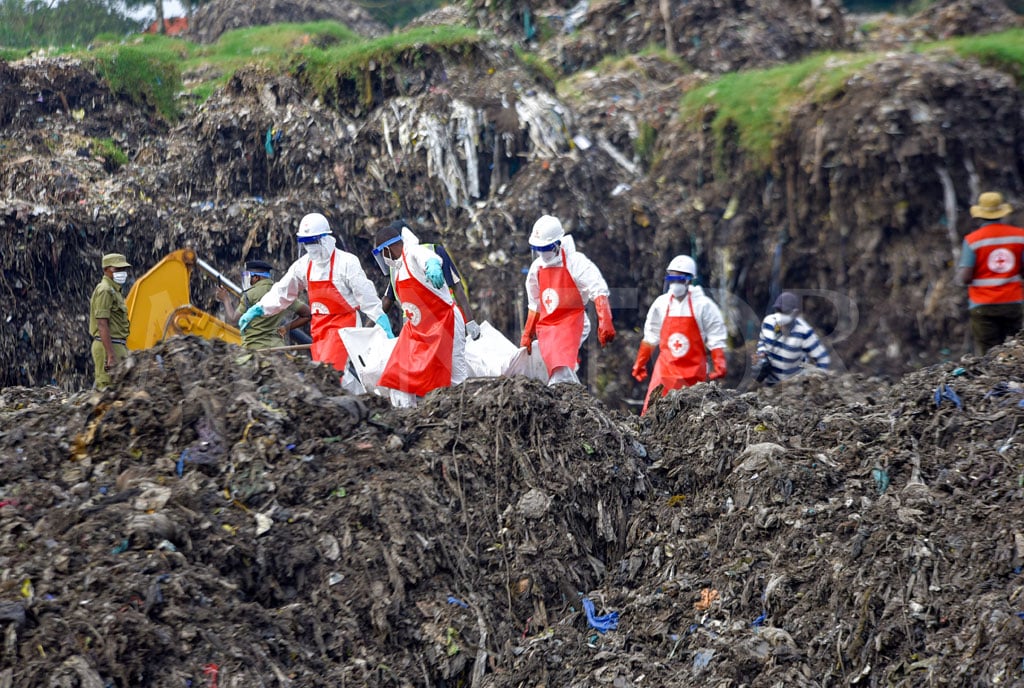Prime
Kampala’s ‘sick’ taxis and how they trouble passengers

Interior. One of the ramshackled taxi at the Old Taxi Park. PHOTO BY MICHAEL KAKUMIRIZI
What you need to know:
KCCA recently developed a multi-modal Urban Transport master plan for the greater Kampala metropolitan areas. The metropolitan area is comprised of Kampala, Wakiso, Mpigi and Mukono.
Kampala. On Monday this week, 14 people narrowly escaped death after the taxi they were travelling in knocked a barricade as it tried to negotiate a corner at Namungoona, swerving before it screeched to a halt.
The life-threatening incident compelled passengers to frantically scatter out of the taxi amid hysterical screams, attracting passersby, who raced to witness if there were any fatalities.
Faced with a barrage of insults from the passengers, the driver, who only identified himself as Mr Sserwadda, revealed that the taxi had failed to brake as he slopped towards the Northern Bypass.
Formerly a roundabout, the place is currently being upgraded into a flyover by the Uganda National Roads Authority (Unra) to reduce congestion which is usually occasioned by a fleet of cars from Nansana on Hoima Road and on sides of the bypass.
The place is barricaded and it requires motorists to meticulously maneuver through.
The Namungoona incident represents many unregistered accidents both in the city and across the country caused by poor mechanical conditions of taxis.
The big problem
A two-day spot-check by this newspaper on most Kampala roads, taxi parks and stages found out that some taxis are in a sorry state.
The mini survey was prompted by the ever-increasing mechanical breakdowns of taxis on the roads and the alarming poor sanitation of taxis.
We found out that if it is not faulty lights or side mirrors, then it is either worn out tyres and steering wheel or dirty seats with bedbugs, and excessive exhaust smoke.
These poor mechanical condition is worsened by errant drivers who ride against traffic rules, sending passengers into harm’s way.

Broken down. A taxi in a dangerous mechanical condition on Sir Apollo Kagwa Road in Kampala on June 20, 2019. PHOTO BY MICHAEL KAKUMIRIZI
Mr Charles Ssembabulidde, the spokesperson of traffic police, says the standard for a vehicle include a good general body of a vehicle, good tyres, well-fitted chairs, sliding glasses, lights, number plate and the vehicles neatness.
While a taxi is required to carry only 14 passengers, taxi operators flout this traffic rule and load excess passengers.
It is common to find passengers stranded on the road after their taxi experienced a mechanical breakdown. Such incidences usually cause unnecessary traffic snarl-up and delays.
Due to limited options of public transport in the city, passengers board these taxis amid anguish and desperation.
Although the city authority recently came up with a multimodal transport master plan for the Kampala Metropolitan area, the plan is yet to be rolled out as there is no funding.
The master plan seeks to construct and operate a robust mass rapid system with buses and Light Rail Transit by 2040. It is also set to ensure an environment-friendly transport system and promote sustainable mobility.
But its delayed implementation means that passengers will have to brace for tough public transport conditions which are compounded by incessant wrangles among the different factions of the city transport players.
The taxi drivers
Mr Yasiin Ssematimba, the chairperson of Kampala Operational Taxi Stages Association (Kotsa), admits that there are very many taxis in the city whose mechanical conditions are nerve-racking.
He, however, blames authorities for dragging their feet towards enforcing traffic laws among notorious motorists whom he says defy traffic regulations with utmost impunity.
“Our role as leaders stops at taxi stages and parks and we usually chase away taxi operators whose vehicles are in a sorry state because we are mindful of the lives of the passengers who are actually our bosses. Now after chasing them, they start roaming on streets to pick passengers and some of them actually work at night,” he says.
A study conducted in 2018 during the compilation of the Greater Kampala’s multi-modal transport masterplan, found out that taxis account for 22 per cent of the mode of transport in Kampala Metropolitan.
According to the study, walking accounts for 46 per cent, boda-bodas 17 per cent while 13 per cent of people drive (private cars).
But with taxis being the second highest mode of transport in the metropolitan area, it implies that if the taxis are exposed to ‘health’ risks, a significant number of passengers would fall victim.
The law
Section 178 (e) of the Traffic and Road Safety Act mandates traffic police to inspect motor vehicles and trailers in the country to ascertain their road worthiness.
However, the existence of taxis in bad mechanical condition shows that authorities are resting on their laurels.
Several taxi operators say while it is a requirement for every transport operator to have a passenger service car in good mechanical condition, the cost of maintenance or new car is high.
As such, taxi operators say, they end up using second hand taxis. The problem of taxis with poor mechanical conditions cuts across the five divisions of the city.
“The cost of a new taxi now ranges from Shs60m to Shs70m which is isn’t easy to raise and that’s why you see most operators with old taxis. It is the matter of how you service it and operate but this isn’t sustainable since such taxis keep breaking down every time even when passengers are aboard,” said Mr Yunus Muzaganda, a taxi driver.
Although Mr Ssematimba says taxi operators can always access small loans from financial institutions, taxi operators are against the idea, they argue that these institutions charge a high interest rate which does not rhyme with their income levels.
While inspection of taxis in city parks is the mandate of KCCA’s directorate of public health, we found out operators say the former are overwhelmed by big numbers of taxis hence some go uninspected. KCCA puts the number of taxis in the city at 15,000.
Taxi operators are supposed to ensure that passengers are shuttled in a clean place and are required to fumigate the interior of a taxi to kill bedbugs, and ensure that seats are in good shape.
No inspection
Last year, Parliament banned the importation of vehicles that are between nine and 15 years old from the date of manufacture, according to the Amended Traffic and Road Safety Act, 2018 to reduce pollution.
But the halt on the inspection of all public service vehicles by the same Parliament in 2017 is likely to worsen the already fragile situation.
Government through the Works and Transport ministry must carry out inspection of public service vehicles at least twice a year for public service vehicles and once a year for private vehicles.
However, for the last two years now, there has not been any inspection of public service vehicles and this means that if traffic officers manning roads do not identify any vehicles in a bad mechanical condition, they continue operating.
Parliament in 2017 suspended the mandatory motor vehicle inspection after Mukono County legislator Muyanja Ssenyonga raised a red flag against the ‘exorbitant’ inspection fees.
Mr Muyanja also argued that it was unrealistic for government to set a short deadline for inspection of public service vehicles yet the country has a few inspection centres.
Speaker Rebecca Kadaga later directed the parliamentary committee on physical infrastructure to investigate the matter and compile a report.

Kampala Lord Mayor Erias Lukwago addressing journalists recently
The committee’s report which was tabled on February 9 2018 recommended that the Ministry of Works and Transport should renegotiate vehicle inspection contract which it had awarded to Société Générale de Surveillance (SGS) in 2015.
Nakifuma County MP Robert Kafeero Ssekitoleko, who chairs the Parliamentary committee on physical infrastructure, told Daily Monitor in an interview that Parliament would discuss the report which recommended termination of SGS’ motor vehicle inspection deal next week.
Commissioner of Transport at the Ministry of Works and Transport Winstone Katushabe says they are now majorly doing manual inspection through local authorities and traffic officers as they await Parliament to fully pronounce itself on inspections.
Mr Katushabe acknowledges the fact that the there are several complaints from the public about the dangerous mechanical conditions of some vehicles.
“Every machine requires inspection and our major objective in this is to reduce road carnage which is caused by, among others, poor mechanical condition. We are currently engaging stakeholders on how we can go about it because every regulation must be in the interest of the public,” he says.
Solution
Mr Ssembabulidde recently came up with a plan to work with leaders in local governments to crackdown vehicles that are in bad mechanical condition.
He, however, noted that while traffic police has done its best to enforce the law, owners of old taxis tend to hide during day only to reappear in the evening when traffic officers are busy manning roads, adding that they are currently constrained.
“We shall continue cracking down on them because it is our mandate as traffic police to ensure safety on the roads. Most of the taxis we have impounded are still at our various police stations. I advise operators in the transport business to ensure that they carry out repairs on their vehicles to avoid fines,” he says.
Transport master plan
Solution. KCCA recently developed a multi-modal Urban Transport master plan for the greater Kampala metropolitan areas. The metropolitan area is comprised of Kampala, Wakiso, Mpigi and Mukono.
Under the plan, KCCA seeks to construct and operate a robust Mass Rapid System with buses and Light Rail Transit by 2040.
The plan which is yet to be officially unveiled is also set to ensure an environmentally friendly transport system and promote sustainable mobility.
Once implemented, KCCA says this new transport infrastructure will encourage commuters to use sustainable transport modes such as walking, cycling, and buses. However, the city authority is yet to get funding to implement this master plan.




